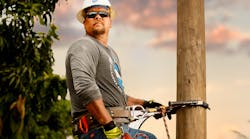Spotlight on the Line Trade: Mike Wolfe of Southwest Rural Electric Association
- Born in Lawton, Oklahoma, as the youngest of six children. He has two brothers and three sisters
- Married to Jennifer, and they have four kids: three sons and one daughter. They also have one grandson and three granddaughters
- Followed in the footsteps of his father-in-law, a foreman who brought him up through his apprenticeship. To this day, he says he’s never seen anyone who could climb or come down a pole as fast and as smooth as him.
- Enjoys spending time outdoors doing activities such as camping and shooting 3D archery.
Early Years
I’m from a very small town in rural southwest Oklahoma, and honestly, Southwest Rural Electric Association was about the best career opportunity in the county. I really hadn’t thought about the industry until I got the job, and now I can’t imagine doing anything else. When I got the job, I went straight on the construction crew, and I knew right away that was all I wanted to do. Keeping the lights on is such a rewarding job.
Day in the Life
I am currently the operations manager, but I will always be 100 percent lineman. My main responsibility is to make sure all of the guys go home to their families. After that, it’s my job to ensure we stay in compliance and oversee the day-to-day operations of the co-op. Typically I’m scheduling the work that needs to be done and doing crew visits and job inspections. Annually I am responsible for the operations budget and the work plan.
Challenges and Rewards
One of the biggest challenges of working in the utility industry is dealing with Mother Nature and its elements. That’s also what makes the profession so rewarding. Working long hours during storms and ice gives you such proud feeling when you get to see the lights come on. One of my personal biggest challenges was moving from being one of the guys on the crew to a management position, especially being at such a small company.
Safety Lesson
The day I learned the importance of safety is a day I will never forget. It was the day we lost one of the best men I know and one of my best friends. I was on the job when the fatality took place.
Memorable Storm
The worst storm I have worked on was the ice storm of 2010. Our 7,800-meter co-op lost about 3,000 poles and had every meter off for a period of time. I think it was 10 days before the last residential meter was back on and weeks more before we had everything back to normal.
I never worked a storm that we didn’t end up having a good time. When we work long hours, it’s not uncommon for tempers to flare up a bit, but it puts our crews in a better mood knowing that once the job is done, our members will have their power restored.
In the Field
Right now, we’re working on tie lines to tie substations together to improve reliability with options to backfeed in case of broken poles or any other problems. One of the things we are doing to make our system more robust is adding iron ductile poles throughout the system in specific places and where there is large equipment such as regulators, reclosers or large transformers.
Tools and Technology
Battery-operated tools are among the best things that have come along for linemen. They help prevent elbow and shoulder injuries as well as help linemen stay safe when they squeeze connectors in tight spaces on hot lines. Also, the mapping and outage management system on our iPads helps locate the outages and allows our guys to check the meters on any line to see if they have power.
Volunteering Overseas
In 2018 I was lucky enough to be selected to work on the Energy Trails international electrification project sponsored by Oklahoma’s and Colorado’s electric cooperatives and NRECA International. The team of volunteers traveled to Guatemala to electrify two rural villages. There is nothing like the feeling of turning someone’s lights on for the first time. It is a once-in-a-lifetime opportunity. I have recently been asked to go back as a team leader on the 2019 project, and I can’t wait to go do it again. I’m so fortunate and honored to be able to experience it twice.
Future Plans
My future plans are to help my co-op keep up with the changing industry, which includes technology and alternative energy sources like wind and solar. I want to be able to give our members the most reliable and affordable power we can. Then when it comes time, I plan to retire and travel the country with my wife.


